#North Carolina 30
Text

"North Carolina 30" by Aaron Siskind. 1951
19 notes
·
View notes
Text
As cold weather sweeps across the U.S., some electric vehicle owners are learning a bitter truth: Low temperatures can stop the cars dead in their icy tracks.
The issue crystallized this week when some Tesla owners in Chicago discovered their EVs' batteries had died in sub-zero temperatures. Drivers also said some of Tesla charging stations weren't working, or if they did work that the stations were taking longer than usual to charge up their vehicles.
“I've been here for over five hours at this point, and I still have not gotten to charge my car,” Tesla driver Brandon Welbourne told CBS Chicago. “A charge that should take 45 minutes is taking two hours.”
What happens to electric vehicles in cold weather?
Here's what to know.
Electric vehicles are less efficient in cold weather, with Recurrent's research finding that below-freezing temperatures reduced driving range up to 30% on 18 popular EV models.
An EV with a 200 to 215 mile range may only go 150 to 175 miles in the cold, Recurrent's Case said, while noting even that reduced mileage is often sufficient for most drivers. “The average person with an EV drives 30 miles a day,” he said.
Still, a shorter range in cold weather could be an issue for some owners if their EV runs out of juice miles earlier than expected, potentially leaving to hunt for an available charger or, worse, stranded in dangerously frigid conditions.
(continue reading) ❄️ 🚗 🥶
#tesla#elon musk#electric vehicles#yikes#as much as i hate those stupid soap bubble looking cars its not just tesla#yeah this might be a prob#lol i think i can wait a bit longer for my ev#i frequently drive to georgia and north carolina and nyc and dc#i couldnt imagine getting stranded on the side of the road in freezing temps#because my charge died about 30% sooner than i planned#and charging stations are so few and far between to begin with#im not knocking the technology but issa problem#❄️ 🚗 🥶
98 notes
·
View notes
Text
#black history#black history month#melanin#north carolina#uploads#videos#decade: 1930s#1930s#30s#baseball#1930s fashion#1930s style#1930s art
45 notes
·
View notes
Text

There Had Been Rumors All Day About Elvis...
By Jerry Kenion
Greensboro Daily News
March 14, 1974
Then the sleek white plane touched down and taxied toward the front of Atlantic Aero. There was a rush for the doors as two dozen women braved the jet blast to move a bit closer to the plane. The black limousine was parked just steps from where the singing star would hit the bottom step of the plane's stairs.
Several people left the plane and climbed into the limousine. Then, there he was. The King. He walked slowly down the stairs, the wind blowing his black caped coat, and flared black trousers. Elvis paused to greet someone in his exclusive circle, glanced up through tinted sunglasses at the few fans waving and taking pictures, and disappeared into the limousine.
#from what i can tell this photo is from march 14th 1974...tho he doesnt appear to be wearing the cape as described#i couldnt find any other photos from this landing tho and the reason it says ~few~ fans is bc there were rumors spread to conceal when and#where the arrival would be. so only about 20-30 fans were there on the tarmac that chanced waiting on that day and time#elvis#elvis presley#1974#march 14#greensboro north carolina#elvis planes#70s elvis#70s shag carpeting elvis#elvis photos#elvis history#elvis quotes#elvis meetings#elvis fans#my edits#my edit
32 notes
·
View notes
Text

The Northern Cardinal is the most popular state bird (Illinois, Indiana, Kentucky, North Carolina, Ohio, Virginia, and West Virginia).
#30 days of trivia#trivia#random trivia#state bird#northern cardinal#cardinal#illinois#indiana#north carolina#kentucky#ohio#virginia#west virginia
6 notes
·
View notes
Text
Things Biden and the Democrats did, this week #14
April 12-19 2024
The Department of Commerce announced a deal with Samsung to help bring advanced semiconductor manufacturing and research and development to Texas. The deal will bring 45 billion dollars of investment to Texas to help build a research center in Taylor Texas and expand Samsung's Austin, Texas, semiconductor facility. The Biden Administration estimates this will create 21,000 new jobs. Since 1990 America has fallen from making nearly 40% of the world's semiconductor to just over 10% in 2020.
The Department of Energy announced it granted New York State $158 million to help support people making their homes more energy efficient. This is the first payment out of a $8.8 billion dollar program with 11 other states having already applied. The program will rebate Americans for improvements on their homes to lower energy usage. Americans could get as much as $8,000 off for installing a heat pump, as well as for improvements in insulation, wiring, and electrical panel. The program is expected to help save Americans $1 billion in electoral costs, and help create 50,000 new jobs.
The Department of Education began the formal process to make President Biden's new Student Loan Debt relief plan a reality. The Department published the first set of draft rules for the program. The rules will face 30 days of public comment before a second draft can be released. The Administration hopes the process can be finished by the Fall to bring debt relief to 30 million Americans, and totally eliminate the debt of 4 million former students. The Administration has already wiped out the debt of 4.3 million borrowers so far.
The Department of Agriculture announced a $1 billion dollar collaboration with USAID to buy American grown foods combat global hunger. Most of the money will go to traditional shelf stable goods distributed by USAID, like wheat, rice, sorghum, lentils, chickpeas, dry peas, vegetable oil, cornmeal, navy beans, pinto beans and kidney beans, while $50 million will go to a pilot program to see if USAID can expand what it normally gives to new products. The food aid will help feed people in Bangladesh, Burkina Faso, Burundi, Chad, Democratic Republic of the Congo, Djibouti, Ethiopia, Haiti, Kenya, Madagascar, Mali, Nigeria, Rwanda, South Sudan, Sudan, Tanzania, Uganda, and Yemen.
The Department of the Interior announced it's expanding four national wildlife refuges to protect 1.13 million wildlife habitat. The refuges are in New Mexico, North Carolina, and two in Texas. The Department also signed an order protecting parts of the Placitas area. The land is considered sacred by the Pueblos peoples of the area who have long lobbied for his protection. Security Deb Haaland the first Native American to serve as Interior Secretary and a Pueblo herself signed the order in her native New Mexico.
The Department of Labor announced new work place safety regulations about the safe amount of silica dust mine workers can be exposed to. The dust is known to cause scaring in the lungs often called black lung. It's estimated that the new regulations will save over 1,000 lives a year. The United Mine Workers have long fought for these changes and applauded the Biden Administration's actions.
The Biden Administration announced its progress in closing the racial wealth gap in America. Under President Biden the level of Black Unemployment is the lowest its ever been since it started being tracked in the 1970s, and the gap between white and black unemployment is the smallest its ever been as well. Black wealth is up 60% over where it was in 2019. The share of black owned businesses doubled between 2019 and 2022. New black businesses are being created at the fastest rate in 30 years. The Administration in 2021 Interagency Task Force to combat unfair house appraisals. Black homeowners regularly have their homes undervalued compared to whites who own comparable property. Since the Taskforce started the likelihood of such a gap has dropped by 40% and even disappeared in some states. 2023 represented a record breaking $76.2 billion in federal contracts going to small business owned by members of minority communities. This was 12% of federal contracts and the President aims to make it 15% for 2025.
The EPA announced (just now as I write this) that it plans to add PFAS, known as forever chemicals, to the Superfund law. This would require manufacturers to pay to clean up two PFAS, perfluorooctanoic acid and perfluorooctanesulfonic acid. This move to force manufacturers to cover the costs of PFAS clean up comes after last week's new rule on drinking water which will remove PFAS from the nation's drinking water.
Bonus:
President Biden met a Senior named Bob in Pennsylvania who is personally benefiting from The President's capping the price of insulin for Seniors at $35, and Biden let Bob know about a cap on prosecution drug payments for seniors that will cut Bob's drug bills by more than half.
#Thanks Biden#Joe Biden#jobs#Economy#student loan debt#Environment#PFAS#politics#US politics#health care
750 notes
·
View notes
Text
Published May 16, 2024
North Carolina Republicans are pushing legislation that would remove the state’s health exemption to laws banning masks in public, citing protestors’ wearing them in pro-Palestine campus rallies. If the state GOP’s “Unmasking Mobs and Criminals” bill passes, North Carolina would become the first in the country since 2020 to make it illegal to avoid infectious diseases like Covid-19—which people can also get while protesting—by masking in public. The bill passed the state Senate on Wednesday in a 30-15 party-line vote. Due to Senate revisions, it will have to pass the Republican-majority state House again. But even if Democratic Gov. Roy Cooper vetoes the law, the Republican-majority state legislature will have the power to override him.
Covid-19 continues to kill people in the United States, with at least 20,000 confirmed deaths linked to Covid infections since the start of 2024, Millions more are developing Long Covid, the risk of which increases with every subsequent infection. Immunocompromised patients are at particular risk of death: besides their underlying conditions, immunocompromising medications can reduce the efficiency of Covid vaccines and boosters. Masks, specifically N95 and KN95s, are very effective in stopping its spread, and wearing one in a crowd can allow immunocompromised people like recent transplant recipients to participate in civic life and political action. Mask-wearing is more effective in stopping transmission in crowds when more people do it
#mask up#covid#covid 19#covid isn't over#pandemic#covid conscious#covid is airborne#wear a mask#coronavirus#disability rights
539 notes
·
View notes
Text
I hate like 85% of other comic book fans but I love the old mail-in pages so much
#thoughts from the beneath#I've been reading a lot of late 80s 90s comics and they always make me happy to see#not only in the old days they would publish your terrible opinions they would put your full name and address underneath it#also its just nice to see other people talking about and liking what you like with out the creeping rot of the internet#like the climate currently in comics I don't think they could do that now or maybe it would just be more insufferable#bc when its older ones and they have a bad take I'm like jimmy from north carolina is probably like an adult now with different opinions#meanwhile with new comic books fans bad opinions I know they're still out there and also like 30
0 notes
Text
Note: Reasons to Be Cheerful has had weirdly huge formatting issues for the past six or so months, so if that version is a mess, this link should work better.
"Florida Power & Light Company (FPL), the Sunshine State’s largest power utility, employs all the people you might expect: electricians, lineworkers, mechanical engineers — and a few you might not. For over 40 years, the company has kept a team of wildlife biologists on staff. Their task? Monitoring the giant carnivorous reptiles that reside in one of the state’s nuclear power plants.
Saving the American Crocodile
What sounds like a low-budget creature feature is actually a wildly successful conservation story. It goes like this: In 1975, the shy and reclusive American crocodile was facing extinction. Over-hunting and habitat decline caused by encroaching development had pushed its numbers to a record low. By 1975, when it was listed as endangered under the Endangered Species Act, there were only 200 to 300 left.
Three years later, in 1978, workers at the Turkey Point nuclear power plant in Homestead, Florida happened upon something that must have made them gasp: a crocodile nest along one of the plant’s 5,900-acre “cooling canals.” Rather than drive the crocs away — perhaps the easiest solution — FPL hired a team of biologists and implemented a Crocodile Management Plan. Its goal was unconventional: provide a suitable habitat for the crocs within the workings of the nuclear power plant, allowing both to coexist.
Over the course of the next 30 years, FPL’s wildlife biologists monitored nests, tagged hatchlings and generally created a hospitable environment for the reptiles. As it turned out, the plant’s cooling canals provided an ideal habitat: drained earth that never floods on which to lay eggs directly adjacent to water. Over the years, more and more crocs made the cooling canals home. By 1985, the nests at Turkey Point were responsible for 10 percent of American crocodile hatchlings in South Florida. In 2007, the U.S. Fish and Wildlife Service downgraded the American crocodile’s status from endangered to threatened, singling out FPL for its efforts.
The program continues to this day. To date, biologists have tagged some 7,000 babies born at the plant. In 2021, there were a record-setting 565 crocodile hatchlings at the Turkey Point facility.
"Reconciliation Ecology"
Turkey Point’s efforts are an example of what is known in the conservation world as “reconciliation ecology.” Rather than create separate areas where nature or animals can thrive in isolation from humans, reconciliation ecology suggests that we can blend the rich natural world with the world of human activity. Michael Rosenzweig, an emeritus professor of ecology and evolutionary biology at the University of Arizona, was a leading force in establishing this concept. The author of Win-Win Ecology: How the Earth’s Species can Survive in the Midst of Human Enterprise, Rosenzweig has pointed out that although human encroachment has typically been considered a threat to biodiversity, the notion that the world must be either “holy” or “profane,” ecologically speaking, is simply not true.
“In addition to its primary value as a conservation tool, reconciliation ecology offers a valuable social byproduct,” writes Rosenzweig in his first chapter. “It promises to reduce the endless bickering and legal wrangling that characterize environmental issues today.”
-via Reasons to Be Cheerful, May 5, 2022. Article continues below. All headings added by me for added readability.
Dr. Madhusudan Katti, an associate professor in the Department of Forestry and Environmental Resources at North Carolina State University, was inspired by Rosenzweig when he did his postdoc at Arizona State. Katti has now been in the field of reconciliation ecology for two decades and teaches classes on the subject. “To me it’s finding solutions to reconciling human development with biodiversity conservation,” Katti says.
This common ground between development and conservation can be consciously planned, like FPL managing a crocodile habitat at a nuclear power plant or the state-sponsored vertical gardens and commercial farms on high-rise buildings in Singapore. Other examples include the restoration of the coral reef around an undersea restaurant in Eilat, Israel, or recent legislation in New York City requiring patterned glass on high-rise buildings, making windows more visible to migratory birds. Other planned examples of reconciliation ecology can be more individually scaled: a rooftop garden in an urban setting, modifying your garden to earn a “backyard bird habitat” certification from the Audubon Society, or even just mowing your lawn less often...
Reconciliation Ecology: Nature's Already Doing It Without Us
But there are countless examples of “accidental” incidents of reconciliation ecology, as well. One of Katti’s favorites is the kit fox of California’s San Joaquin Valley. “The kit fox was one of the very first species listed on the Endangered Species Act,” Katti says. Its decline was caused by habitat loss through agricultural and industrial development, as well as the extermination of the gray wolf population, which led to an increase in coyotes. So kit foxes adapted and moved to new habitats. One of these was the city of Bakersfield, California.
“Bakersfield, surrounded by oil pumps, would be the last place you’d expect to find an endangered species,” Katti says. But researchers think kit foxes have migrated to Bakersfield because they actually have more protection there from predators like coyotes and bobcats. “The kit foxes have figured out that if they can tolerate the human disturbance and live with people, then they are safer from all these other predators,” he says.
Living in the city has led to some interesting behavioral changes. In the wild, for instance, a female kit fox gives birth to her young and raises them by herself in a den. But in the city, researchers have observed multiple females raising their litters together in the same den. “It’s like a form of cooperative breeding,” Katti says. “That wouldn’t happen in the wild.” ...
The Big Picture: How We Think about Conservation
Reconciliation Ecology isn’t just we humans welcoming animals like crocodiles and foxes into our environments, though. It’s also living with nature in a way that most Western societies haven’t done since the Enlightenment. “In recent years, there’s been a recognition that the ‘fortress conservation’ model — keeping nature separated from humans and not thinking of or valuing human-inhabited landscapes — those ideas are outdated,” says Katti.
In fact, in Katti’s classes on reconciliation ecology, he embraces the notion of reconnecting people with their land if they have been unjustly separated from it. “The term reconciliation also applies to all the colonial legacies where both nature and people have been harmed,” Katti says. “For Indigenous communities, the harm done to ecosystems, it’s happened together. So you can talk about addressing both. That’s where a lot of my thinking is at the moment.”
A hopeful version of this sort of reconciliation is happening in California where colleagues of Katti’s who are tribal members are re-introducing “tribal burns” in some areas. Controlled burns have been a part of many Indigenous cultures for millenia, both as a way to prevent devastating forest fires, but also to encourage the growth of certain plants like hazel that are used for basket-weaving and other crafts.
“The notion that people don’t belong there and ‘let nature take care of itself’ doesn’t really work,” Katti says. “That’s the legacy of Western European Enlightenment thinking — a divide between human and nature. That is a real faulty view of nature. People have been part of the ecosystem forever.”
-via Reasons to Be Cheerful, May 5, 2022
#a bit older but still ongoing/relevant and still very cool#florida#crocodile#reptile#ecology#environment#sustainability#endangered species#united states#california#kit fox#nuclear power plant#reconciliation#colonialism#the enlightenment#conservation#human beings#good news#hope#urban ecology
1K notes
·
View notes
Text
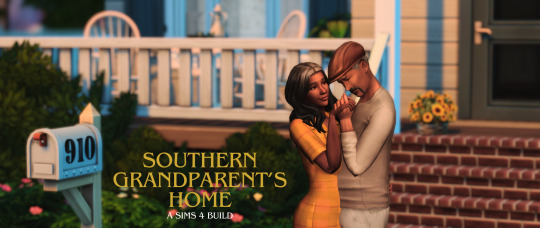


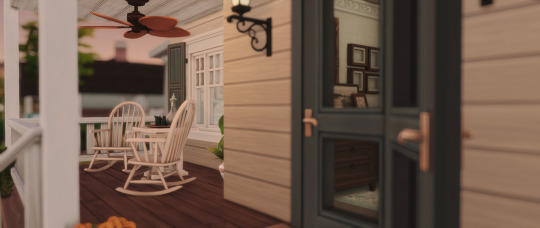
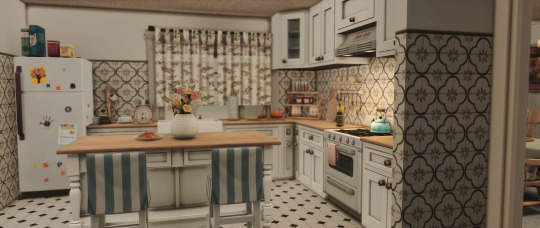
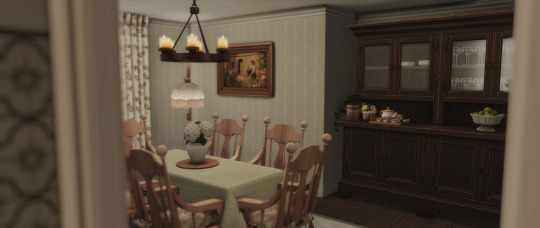

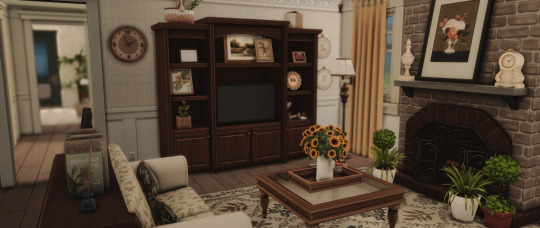


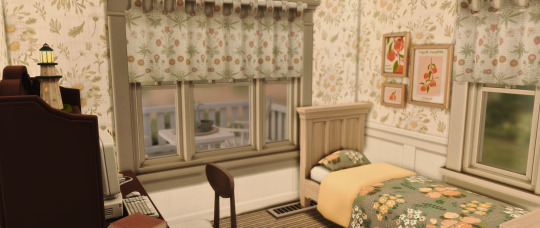

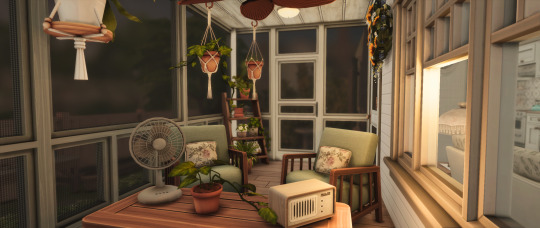


Southern Grandparent's Home
Download Here
Lot Size: 30 x 20
Packs Used: Get Famous, Seasons, Cats & Dogs, City Living, Get Together, Get To Work, Jungle Adventure, Parenthood
This definitely brings back memories of my grandparent's home in rural North Carolina. Especially the screened porch! Ugh I'm so happy with this build as it's very near and dear to my heart!
The sims in the first photo are modeled after them.
I will try and upload a light cc version soon!
Big Special thanks to @joyceisfox, @awingedllama, @peacemaker-ic, @imfromsixam, & @harrie-cc for making such amazing cc!
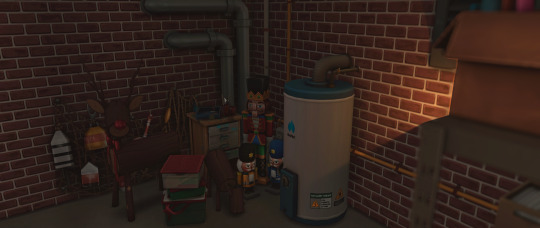
PS: there is a little bonus basement I've included that is accessible from the backyard! The washing machine (not pictured) is purely decor! I will be using more basements/garages for my sim's holiday decor instead of the family inventory for more realistic gameplay!
#sims 4#sims 4 build#sims 4 maxis match#sims 4 custom content#ts4 lots#sims 4 lot#sims 4 cc#sims 4 lots#mybuilds#my interiors#ts4 interiors
540 notes
·
View notes
Photo
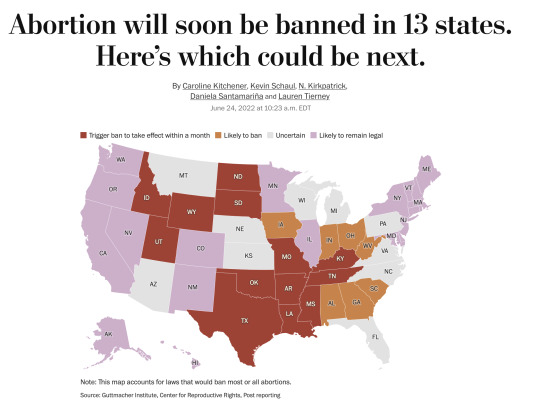
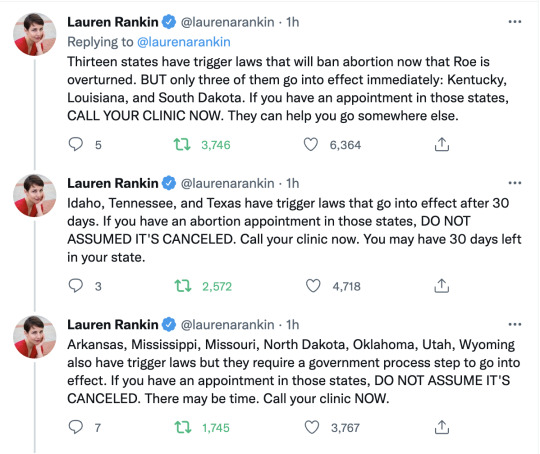
[”Abortion will soon be banned in 13 states. Here’s which could be next.”
Trigger ban to take effect within a month: Idaho, Utah, Wyoming, North Dakota, South Dakota, Texas, Oklahoma, Missouri, Arkansas, Louisiana, Mississippi, Tennessee, Kentucky
Likely to ban: Iowa, Indiana, Ohio, West Virginia, Alabama, Georgia, South Carolina
Uncertain: Arizona, Montana, Nebraska, Kansas, Wisconsin, Michigan, Pennsylvania, Virginia, North Carolina, Florida
Likely to remain legal: Washington, Oregon, California, Nevada, Colorado, New Mexico, Alaska, Hawaii, Minnesota, Illinois, New York, Maryland, New Jersey, Connecticut, Delaware, Massachusetts, Rhode Island, New Hampshire, Vermont, Maine]
[”Thirteen states have trigger laws that will ban abortion now that Roe is overturned. BUT only three of them go into effect immediately: Kentucky, Louisiana, and South Dakota. If you have an appointment in those states, CALL YOUR CLINIC NOW. They can help you go somewhere else.
Idaho, Tennessee, and Texas have trigger laws that go into effect after 30 days. If you have an abortion appointment in those states, DO NOT ASSUMED IT'S CANCELED. Call your clinic now. You may have 30 days left in your state.
Arkansas, Mississippi, Missouri, North Dakota, Oklahoma, Utah, Wyoming also have trigger laws but they require a government process step to go into effect. If you have an appointment in those states, DO NOT ASSUME IT'S CANCELED. There may be time. Call your clinic NOW."]
--------
It is still legal to travel to states where abortion is legal. The FDA allows abortion pills to be available by mail, and they are approved for the first 10 weeks of pregnancy. Telemedicine abortions will banned in states where abortion is illegal, but international groups like Aid Access will offer online consultations and mail pills to all states.
Your internet activity can be used against you in court. Delete any period tracking apps and do not disclose your pregnancy online. Learn about internet privacy to keep your abortion private and secure.
National resources for info and access to abortion:
Aid Access: https://aidaccess.org/en/
Find an abortion provider: https://www.abortionfinder.org/
National Abortion Federation: https://prochoice.org/#
NAF Hotline (Monday - Friday 8 am - 7 pm EST, Saturday & Sunday
8 am - 4 pm EST): 1-800-772-9100
Now is the time to donate to your local abortion fund. If you live in a state where abortion is likely to stay legal, clinics expect an influx of people from other states looking for healthcare.
National Network of Abortion Funds: http://abortionfunds.org
List of abortion funds in states likely or certain to prohibit abortion:
https://www.thecut.com/article/donate-abortion-fund-roe-v-wade-how-to-help.html
#Im really not the best informed about this just wanted to share some resources because I have a following on here#abortion#roe v wade#roe vs. wade#abortion rights#reproductive choice#reproductive rights#bodily autonomy#pro choice#reproductive health#abortion ban#abortion funds#abortion access#boost#signal boost#abortion resources
10K notes
·
View notes
Text
I have had a pretty terrible last three days. Saturday I finally made the decision to replace my car, which I am deeply attached to and have had for the past 19 years of my life, and found a replacement down in North Carolina near my family. I planned to take one last drive with him to go down, and turn him in at the dealership, only to be hit by a truck hard enough to total my car yesterday. I'm a little banged up on my shoulder and sporting a pretty tender bruise to the side of my head, but I'm otherwise fine.
After dealing with all of that and arranging a flight down instead, I got a bad feeling about the birds and the Cold after checking the weather report that said it would get to -30 wind-chill last night. I went out to check on the birds again, only to find Indie on the floor in cold shock. I brought him indoors and spent most of last night up and down checking on him and slogging out into the cold to check on the others. Thankfully my own birds are all very cold hardy and are doing fine, but Indie is a higher Spalding, and seems to be far less cold tolerant.


Thankfully, he survived the night and warmed up, and has gotten steadier all day. At 7:30, about when the lights go off in the coops, he promptly decided it was bedtime, turned around on the tray table and tucked himself into bed so completely in the way that I also went to bed a few minutes later.
After some discussion with his owners, I cancelled my flight and rented a car, and I'll be taking him back. They VERY kindly offered to let me bring the girls I was going to breed him to down with him, and they will do the breeding there instead. This is a relief that means I won't have to deal with any peachicks this year, but I'll still hopefully be able to get a bs split leucistic pair from him and my own birds, possibly a trio.
My brother drove out and helped me unload the stuff I'd gone to get yesterday, which was mostly supplies for the birds, extra bedding to keep them warm, and the few personal things I kept in the car. Since I'm moving three birds including one adult male to the south, I'm just going to condense the pens into the barn, where they'll have more room to be indoors through this cold, and have better insulation and be easier to access for me. Of course, that means Stan and co are boarding in Bug's pen and Bug's been relegated to her baby cage for when she must be contained if we leave the house (though that's mostly because it's Too Cold, less because there are birds in her house)

Still big enough to hold her! Thankfully it shouldn't have to hold her long.

She's also extremely jealous I'm paying attention to Indie and not just her. She's been alternating between guarding me and sulking all day.
Anyway. Send some good vibes this way, 2024 has not been treating me very kindly so far.
256 notes
·
View notes
Text
1968 [Chapter 6: Athena, Goddess Of Wisdom]

Series Summary: Aemond is embroiled in a fierce battle to secure the Democratic Party nomination and defeat his archnemesis, Richard Nixon, in the presidential election. You are his wife of two years and wholeheartedly indoctrinated into the Targaryen political dynasty. But you have an archnemesis of your own: Aemond’s chronically delinquent brother Aegon.
Series Warnings: Language, sexual content (18+ readers only), violence, bodily injury, character deaths, New Jersey, age-gap relationships, drinking, smoking, drugs, pregnancy and childbirth, kids with weird Greek names, historical topics including war and discrimination, math.
Word Count: 5.2k
Let me know if you’d like to be tagged! 🥰
💜 All of my writing can be found HERE! 💜
Here at the midway point in our journey—like Dante stumbling upon the gates of the Inferno—would it be the right moment to review what’s at stake? Let’s begin.
It’s the end of August. The delegates of the Democratic National Convention in Chicago officially vote to name Aemond the party’s presidential candidate. His ascension is aided by 10,000 antiwar demonstrators who flood into the city and threaten to set it ablaze if Hubert Humphrey is chosen instead. At the end—in his death rattle—Humphrey begs to be Aemond’s running mate, one last humiliation he cannot resist. Humphrey is denied. Eugene McCarthy, dignity intact, boards a commercial flight to his home state of Minnesota without looking back.
Aemond selects U.S. Ambassador to France, Sargent Shriver, to be his vice president. Shriver is a Kennedy by marriage—his wife, JFK’s younger sister Eunice, just founded the Special Olympics—and has previously headed the Office of Economic Opportunity, the Peace Corps, and the Chicago Board of Education. He also served as the architect of the president’s “War on Poverty” before distancing himself from the imploding Johnson administration. Shriver is not a concession to fence-sitting moderates or Southern Dixiecrats, but an embodiment of Aemond’s commitment to unapologetic progressivism. Richard Nixon spends the weekend campaigning in his native California, a gold vein of votes like the mines settlers rushed to in 1848. George Wallace announces that he will run as an Independent. Racists everywhere rejoice.
Phase III of the Tet Offensive is underway in Vietnam; 700 American soldiers have been killed this month alone. Riots break out in military prisons where the U.S. Army is keeping their deserters. The North Vietnamese refuse to allow Pope Paul VI to visit Hanoi on a peace mission. President Johnson calls both Aemond and Nixon to personally inform them of this latest evidence of the communists’ unwillingness to negotiate in good faith. Daeron and John McCain remain in Hỏa Lò Prison. The draft swallows men like the titan Cronus devoured his own children.
In Eastern Europe, the Russians are crushing pro-democracy protests in the largest military operation since World War II as half a million troops roll into Czechoslovakia. In Caswell County, North Carolina, the last remaining segregated school district in the nation is ordered by a federal judge to integrate after years of stalling. On the Fangataufa Atoll in the South Pacific, France becomes the fifth nation to successfully explode a hydrogen bomb. In Mexico City, 300,000 students gather to protest the authoritarian regime of President Diaz Ordaz. In Guatemala, American ambassador John Gordon Mein is murdered by a Marxist guerilla organization called the Rebel Armed Forces. In Columbus, Ohio, nine guards are held hostage during a prison riot; after 30 hours, they’re rescued by a SWAT team.
The latest issue of Life magazine brings worldwide attention to catastrophic industrial pollution in the Great Lakes. The first successful multiorgan transplant is carried out at Houston Methodist Hospital. The Beatles release Hey Jude, the best-selling single of 1968 in the U.S., U.K., Australia, and Canada. NASA’s Apollo lunar landing program plans to launch a crewed shuttle next year, just in time to fulfill John F. Kennedy’s 1962 promise to put a man on the moon “before the end of the decade.” If this is successful, the United States will win the Space Race and prove the superiority of capitalism. If it fails, the martyred astronauts will join all the other ghosts of this apocalyptic age, an epoch born under bad stars.
The night sky glows with the ancient debris of the Aurigid meteor shower. From down here on Earth, Jupiter is a radiant white gleam, visible with the naked eye and admired since humans were making cave paintings and Stonehenge. But Io is a mystery. With a telescope, she becomes a dust mote entrapped by Jupiter’s gravity; to the casual observer, she doesn’t exist at all.
~~~~~~~~~~
What was it like, that very first time? It’s strange to remember. You’re both different people now.
It’s May, 1966. You and Aemond are engaged, due to be married in three short weeks, and if you get pregnant then it’s no harm, no foul. In reality, it will end up taking you over a year to conceive, but no one knows that yet; you are living in the liminal space between what you imagine your life will be and the cold blade of the truth. Aemond has brought you to Asteria for the weekend, an increasingly common occurrence. The Targaryens—minus one, that holdout prodigal son, always glowering from behind swigs of rum and clouds of smoke—have already begun to treat you like a member of the family. The flock of Alopekis yap excitedly and lick your shins. Eudoxia learns your favorite snacks so she can have them ready when you arrive.
One night Aemond takes your hand and leads you to Helaena’s garden, darkness turned to twilight in the artificial luminance of the main house. You can hear distant voices, chatter and laughter, and the Beatles’ Rubber Soul spinning on the record player in the living room like a black hole, gravity that not even light can escape when it is wrenched over the event horizon.
You’re giggling as Aemond pulls you along, faster and faster, weaving through pathways lined with roses and sunflowers and butterfly bushes. Your high heels sink into soft, fertile earth; the air in your lungs is cool and infinite. “Where are we going?”
And Aemond grins back at you as he replies: “To Olympus.”
In the circle of hedges guarded by thirteen gods of stone, Aemond unzips your modest pink sundress and slips your heels off your feet, kneeling like he’s proposing to you again. When you are bare and secretless, he draws you down onto the grass and opens you, claims you, fills you to the brim as the crystalline water of the fountain patters and Zeus hurls his lightning bolts, an eternal storm, unending war. It’s intense in a way it never was with your first boyfriend, a sweet polite boy who talked about feminist theory and followed his enlightened conscience all the way to Vietnam. This isn’t just a pleasant way to pass a Friday night, something to look forward to between differential equations textbooks and calculus proofs. With Aemond it’s a ritual; it’s something so overpowering it almost scares you.
“Aphrodite,” Aemond murmurs against your throat, and when you try to get on top he stops you, pins you to the ground, thrusts hard and deep, and you try not to moan too loudly as you surrender, his weight on you like a prophesy. This is how he wants you. This is where you belong.
Has someone ever stitched you to their side, pushing the needle through your skin again and again as the fabric latticework takes shape, until their blood spills into your veins and your antibodies can no longer tell the difference? He makes you think you’ve forgotten who you were before. He makes you want to believe in things the world taught you were myths.
But that was over two years ago. Now Aemond is not your spellbinding almost-stranger of a fiancé—shrouded in just the right amount of mystery—but your husband, the father of your dead child, the presidential candidate. You miss when he was a mirage. You miss what it felt like to get high on the idea of him, each taste a hit, each touch a rush of toxins to the bloodstream.
Seven weeks after your emergency c-section, you are healing. Your belly no longer aches, your bleeding stops, you can rejoin the living in this last gasp of summer. Ludwika takes you shopping and you pick out new swimsuits; you’ve gone up a size since the baby, and it shows no signs of vanishing. In the fitting room, Ludwika chain-smokes Camel cigarettes and claps when you show her each outfit, ordering you to spin around, telling you that there’s nothing like Oleg Cassini back in Poland. You plan to buy three swimsuits. Ludwika insists you get five. She pays with Otto’s American Express.
That afternoon at home in your blue bedroom, you get changed to join the rest of the family down by the pool, your first swim since Ari was born. You choose Ludwika’s favorite: a dreamy turquoise two-piece with flowing transparent fabric that drapes your midsection. You can still see the dark vertical line of where the doctors stitched you closed. Now you and Aemond match; he got his scar on the floor of the Breakers Hotel in Palm Beach, you earned yours at Mount Sinai Hospital in Manhattan. There are gold chains on your wrist and looped around your neck. Warm sunlight and ocean wind pours in through the open windows.
Aemond appears in the doorway and you turn to show him, proud of how you’ve pulled yourself together, how this past year hasn’t put you in an asylum. His right eye catches on your scar and stays there for a long time. Then at last he says: “You don’t have something else to wear?”
~~~~~~~~~~
It’s Labor Day, and Asteria has been descended upon by guests invited to celebrate Aemond’s nomination. The dining room table is overflowing with champagne, Agiorgitiko wine, platters of mini spanakopitas, lamb gyros, pita bread with hummus and tzatziki, feta cheese and cured meats, grilled octopus, baklava, and kourabiethes. Eudoxia is rushing around sweeping up crumbs and shooing tipsy visitors away from antique vases shipped here from Greece. Aemond’s celebrity endorsers include Sammy Davis Jr., Sonny and Cher, Andy Williams, Bobby Darin, Warren Beatty, Shirley MacLaine, Claudine Longet, and a number of politicians; but the most notable attendee is President Lyndon Baines Johnson, shadowed by Secret Service agents. He won’t be making any surprise appearances on the campaign trail for Aemond—in the present political climate, he would be more of a liability than an asset—but he has travelled to Long Beach Island tonight to offer his well-wishes. From the record player thrums Jimi Hendrix’s All Along The Watchtower.
When you finish getting ready and arrive downstairs, you spot Aegon: slouching in a velvet chair over a century old, hair shagging in his eyes, sipping something out of a chipped mug he clasps with both hands, flirting with a bubbly early-twenties campaign staffer. Aegon smiles and waves when he sees you. You wave back. And you think: When did he become the person I look for when I walk into a room?
Now Aemond is beside you in a blue suit—beaming, confident, his glass eye in place, a hand resting on your waist—and Aegon isn’t smiling anymore. He takes a gulp of what is almost certainly straight rum from his mug and returns his attention to the campaign staffer, his lady of the hour. You picture him undressing her on his shag carpet and feel disorienting, violent envy like a bullet.
Viserys is already fast asleep upstairs, but the rest of the family is out en masse to charm the invitees and pose for photographs. Alicent, Helaena, and Mimi—trying very hard to act sober, blinking too often—are chit-chatting with the other political wives. Otto is complaining about something to Criston; Criston is pretending to listen as he stares at Alicent. Ludwika is smoking her Camels and talking to several young journalists who are ogling her, enraptured. Fosco and Sargent Shriver are entertaining a group of guests with a boisterous, lighthearted debate on the merits of Italian versus French cuisine, though they agree that both are superior to Greek. The nannies have brought the eight children to be paraded around before bedtime. All Cosmo wants to do is clutch your hand and “help” you navigate around the living room, warning you not to step on the small, weaving Alopekis. When Mimi attempts to steal her youngest son away, he ignores her, and as she begins to make a scene you rebuke her with a harsh glare. Mimi retreats meekly. She has never argued with you, not once in over two years. You speak for Aemond, and Aemond is a god.
As the children are herded off to their beds by the nannies, Bobby Kennedy—presently serving as a New York senator despite residing primarily on his family’s compound in Massachusetts—approaches to congratulate Aemond. His wife Ethel is a tiny, nasally, scrappy but not terribly bright woman, five months pregnant with her eleventh child, and you have to get away from her like a hand pulled from a hot stove.
“You know, I was considering running,” Bobby says to Aemond, chuckling, good-natured. “But when I saw you get in the race, I thought better of it! Maybe I’ll give it a go in ’76, huh?”
“Hey, kid, what a tough year you’ve had,” Ethel tells you, patting your forearm. You can’t tear your eyes from her small belly. She has ten living children already. I couldn’t keep one. What kind of sense does that make? “We’re real sorry for your trouble, aren’t we, Bobby?”
Now he is nodding somberly. “We are. We sure are. We’ve been praying for you both.”
Aemond is thanking them, sounding touched but entirely collected. You manage some hurried response and then excuse yourself. Your hands are shaking as you cross the room, not really seeing it. You walk right into Lady Bird Johnson. She takes pity on you; she seems to perceive how rattled you are. “Oh Lyndon, look, it’s just who we were hoping to speak to! The next first lady of the United States. And how beautiful you are, just radiant. How do you keep your hair so perfect? That glamorous updo. You never have a single strand out of place.” Lady Bird lays a palm tenderly on your bare shoulder. She has an unusual, angular face, but a wise sort of compassion that only comes from suffering. Her husband is an unrepentant serial cheater. “I’ll make you a list of everything you need to know about the White House. All the quirks of the property, and the hidden gems too!”
“You’re so kind. We’ll see what happens in November…”
“Good evening, ma’am,” President Johnson says, smiling warmly. He’s an ugly man, but there’s something hypnotic that lives inside him and shines through his eyes like the blaze of a lighthouse. He pulls you in through the dark, through the storm; he promises you answers to questions you haven’t thought of yet. LBJ is 6’4 and known for bullying his political adversaries with the so-called “Johnson Treatment”; he leans in and makes rapid-fire demands until they forget he’s not allowed to hit them. “I have to tell you frankly, I don’t envy anyone who inherits that den of rattlesnakes in Washington D.C.”
“Lyndon, don’t frighten her,” Lady Bird scolds fondly.
“Everyone thinks they know what to do about Vietnam,” LBJ plods onwards. “But it’s a damned if you do, damned if you don’t clusterfuck. If you keep fighting, they call you a murderer. But if you pull the troops out and South Vietnam falls to the communists, every single man lost was for nothing, and you think the families will stand for that? Their kid in a body bag, or his legs blown off, or his brain scrambled? There’s no easy answer. It’s a goddamn bitch of a quagmire.”
Lady Bird offers you a sympathetic smirk. Sorry about all this unpleasantness, she means. When he gets himself worked up, I can’t stop him. But you find yourself feeling sorry for President Johnson. It will be difficult for him to learn how to fade into disgraced obscurity after once being so omnipotent, so beloved. Reinvention hurts like hell: fevers raging, bones mending, healing flesh that itches so ferociously you want to claw it off.
LBJ gives Lady Bird a look, quick but meaningful. She acquiesces. This has happened a thousand times before. “It was so nice talking to you, dear,” she tells you, then crosses the living room to pay her respects to Alicent.
The president steps closer, looming, towering. The Johnson Treatment?? you think, but no; he isn’t trying to intimidate you. He’s just curious.
“Do you know what Aemond’s plan is for ‘Nam?” LBJ asks, eyes urgent, voice low. “I’m sure he has one. He’s sworn to end the draft as soon as he gets into office, but how is he going to make sure the South Vietnamese can fend off the North themselves? We’re trying to train the bastards, but if we left they’d fold in months. It would be the first war the U.S. ever lost. Does he understand that?”
“He doesn’t really discuss it with me.” That’s true; you know his policies, but only because they are a constant subject of conversation within the family, something you all breathe like oxygen.
“We can’t let Nixon win,” LBJ continues. “It’s mass suicide to leave the country in his hands. The man can’t hold his liquor anymore, getting robbed by Kennedy in ’60 broke something in him. He gets sloshed and shoves his aids around, makes up conspiracies in his head. He’s a paranoid little prick. He’ll surveille the American people. He’ll launch a nuke at Moscow.”
You honestly don’t know what he expects you to say. “I’ll pass the message along to Aemond.”
“People love you, Mrs. Targaryen.” LBJ watching you closely. “Believe it or not, they used to love me too. But I still remember how to play the game. You’re the only reason Aemond is leading the polls in Florida. You can get him other states too. Jack needed Jackie. Aemond needs you. And you’ve had tragedies, and that’s a damn shame. But don’t you miss an opportunity. You take every disappointment, every fucked up cruelty of life and find a way to make it work for you. You pin it to your chest like a goddamn medal. Every single scar makes you look more mortal to those people going to the ballot box in November. You want them to be able to see themselves in you. It helps the mansions and the millions go down smoother.”
“President Johnson!” Aegon says as he saunters over, huge mocking grin. He thumps a closed fist against the Texan’s broad chest; the Secret Service agents standing ten feet away observe this sternly. “How thoughtful of you to be here, taking time out of your busy schedule, squeezing us in between war crimes.”
“The mayor of Trenton,” LBJ jabs.
“The butcher of Saigon.”
Now the president is no longer amused. “You’ve never accomplished anything in your whole damn life, son. Your obituary will be the size of a postage stamp. I’m looking forward to reading it someday soon.” He leaves, rejoining Lady Bird at the opposite end of the room.
You frown at Aegon, disapproving. You’re dressed in a sparkling, royal blue gown that Aemond chose. “That was unnecessary.”
Aegon is wearing an ill-fitting green shirt—half the buttons undone—khaki pants, and tan moccasins. “I just did you a favor.”
“What happened to your new girlfriend? Shouldn’t she be getting railed in your basement right now? Did she have a prior commitment? Did she have a spelling test to study for? Those can be tricky, such complex words. Juvenile. Inappropriate. Infidelity.”
“You know what he brags about?” Aegon says, meaning LBJ. “That he’s fucked more women by accident than John F. Kennedy ever did on purpose.”
“That sounds…logistically challenging.”
“He’s a lech. He’s a freak. He tells everyone on Capitol Hill how big his cock is. He takes it out and swings it around during meetings.”
“And that’s all far less than admirable, but he’s not going to do something like that around me.”
“How do you know?”
“Because he’s not an idiot,” you say impatiently. “He was perfectly civil. And I was getting interesting advice.”
Aegon rolls his eyes, exasperated. “Yeah, okay, I’m sorry I crashed your cute little pep talk with Lyndon Johnson, the most hated man on the planet.”
“I guess you can’t stop Aemond from touching me, so you have to terrorize LBJ instead.”
“Shut the fuck up,” Aegon hisses, and his venom stuns you. And now you’re both trapped: you loosed the arrow, he proved you hit the mark. He’s flushing a deep, mortified red. Your guts are twisting with remorse.
“Aegon, wait, I didn’t mean—”
He whirls and storms off, shoving his way through the crowd. People glare at him as they clutch their glasses and plates, sighing in that What else do you expect from the worthless son? sort of way. You’re still gaping blankly at the place where Aegon stood when Aemond finds you, snakes a hand around the back of your neck, and whispers through the painstakingly-arranged wisps of hair that fall around your ear: “Follow me.”
It’s not a question. It’s a command. You trail him through the living room, into the foyer, and through the front door, not knowing what he wants. Outside the moon is a sliver; the light from the main house makes the stars hard to see. “Aemond, you’ll never believe the conversation I just had with LBJ. He really unloaded, I think the stress is driving him insane. I have to tell you what he said about—”
“Later.” And this is jarring; Aemond doesn’t put anything before strategy. He grabs your hand as he turns into Helaena’s garden, and only then do you understand what he wants. Instinctively, your legs lock up and your feet stop moving. Aemond tugs you onward. He wants it to be like the very first time. He intends to start over with you, the dawning of a new age in the dead of night.
Hidden in the circle of hedges, he takes your face roughly in his hands and kisses you, drinks you down like a vampire, consumes you like wildfire. But your skull echoes with panic. I don’t want him touching me. I don’t want another child with him. “Aemond…”
He doesn’t hear you, or acts like he doesn’t, or mistakes it for a murmur of desire, or chooses to believe it is. He has you down on the grass under the vengeful gaze of Zeus, the fountain splashing, the sounds of the house a low foreign drone. He yanks off your panties, but he doesn’t want you naked like he always did before. He pushes the hem of your shimmering cobalt gown up to your hips and unbuckles his trousers. And you realize as he’s touching you, as he’s easing himself into you: He doesn’t want to have to look at my scar.
You can’t ignore him, you can’t pretend it’s not happening. He’s too big for that. It’s a biting fullness that demands to be felt. So you kiss him back, and knot your fingers in his short hair like you used to, and try to remember the things you always said to him before. And when Aemond is too absorbed to notice, you look away from him, from the statue of Zeus, and peer up into the stone face of Athena instead: the goddess who never married and who knows the answer to every question.
“I love you,” Aemond says when it’s over, marveling at the slopes of your face in the dim ethereal light. “Everything will be right again soon. Everything will be perfect.”
You conjure up a smile and nod like you believe him.
“What did LBJ say?”
“Can I tell you later tonight? After the party, maybe? I just need a few minutes.”
“Of course.” And now Aemond pretends to be patient. He buckles his belt and returns to the main house, his blood coursing with the possibilities only you can make real, his skin damp with your sweat.
For a while—ten minutes, twenty minutes—you lie there on the cool grass wondering what it was like for all those mortals and nymphs, being pinned down by Zeus and then having Hera try to kill them afterwards, raising ill-fated reviled bastards they couldn’t help but love. What is heaven if the realm of the immortals is so cruel? Why does the god of justice seem so immune to it?
When at last you rise and walk back towards the house, you find Mimi at the edge of the garden. She’s on her knees and retching into a rose bush; she’s cut her face on the thorns, but she hasn’t noticed yet. She’s groaning; she seems lost.
You reach for her, gripping her bony shoulders. “Mimi, here, let’s get you upstairs…”
“No,” she blubbers, tears streaming down her scratched cheeks. “Just go away. Leave me.”
“Mimi—”
“No!” she roars, a mournful hemorrhage as she slaps your hands until you release her.
“You don’t have to be this way,” you tell her, distraught. “You can give up drinking. We’ll help you, me and Fosco and Ludwika. You can start over. You can be healthy and present again, you can live a real life.”
Mimi stares up at you, her grey eyes glassy and bloodshot but with a vicious, piercing honesty. “My husband hates me. My kids don’t know I exist. What the hell do I have to be sober for?”
You weren’t expecting this. You don’t know what to say. “We can help make the world better.”
“The world would be better without me in it.”
Then Mimi curls up on the grass under the rose bush, and stays there until you return with Fosco to drag her upstairs to her empty bed.
~~~~~~~~~~
The next afternoon, you’re lying on a lounge chair by the pool. Tomorrow the family will leave Asteria and embark upon a vigorous campaign schedule that will continue, with very few breaks, until Election Day on Tuesday, November 5th. The children are splashing and shrieking in the pool with Fosco, but you aren’t looking at them. You’re staring across the sun-drenched emerald lawn at the Atlantic Ocean. You’re envisioning all the bones and splinters of sunken ships that must litter the silt of the abyss; you’re thinking that it’s a graveyard with no headstones, no memory. Your swimsuit is a red one-piece. Your eyes are shielded by large black Ray Bans aviator sunglasses. Your gaze flicks up to the cloudless blue sky, where all the stars and planets are invisible.
Jupiter has nearly a hundred moons; the largest four were discovered by Galileo in 1610. Europa is a smooth white cosmic marble with a crust of ice, beautiful, immaculate. Ganymede, the largest moon in our solar system and the only satellite with its own magnetic field, is rumored to have a vast underground saltwater ocean that may contain life. Callisto is dark and indomitable, riddled with impact craters; because of her dynamic atmosphere and location beyond Jupiter’s radiation belts, she is considered the best location for possible future crewed missions to the Jovian system. But Io is a wasteland. She has no water and no oxygen. Her only children are 400 active volcanoes, sulfur plumes and lava flows, mountains of silicate rock higher than Mount Everest, cataclysmic earthquakes as her crust slips around on a mantle of magma. Her daily radiation levels are 36 times the lethal limit for humans. If Hades had a home in our corner of the galaxy, it would be Io. She glows ruby and gold with barren apocalyptic fury. You can feel yourself turning poisonous like she is. You can feel your skin splitting open as the lava spills out.
Aegon trots out of the house—red swim trunks, cheap red plastic sunglasses, no shirt, a beach towel slung around his neck, flip flops—and kicks your chair. “Get up. We’re going sailing.”
“I don’t want to talk to anybody.”
“Great, because I’m not asking you to talk. I’m telling you to get in my boat.”
You don’t reply. You don’t think you can without your voice cracking. Aegon crouches down beside your chair and pushes your sunglasses up into your Brigitte Bardot-inspired hair so he can see your face. Your eyes are pink, wet, desperately sad. Deep troubled grooves appear in his forehead as he studies you. Gently, wordlessly, he pats your cheek twice and lowers your sunglasses back over your eyes. Then he stands up again and offers you his hand.
“Let’s go,” Aegon says, softly this time. You take his hand and follow him down to the boathouse.
Five vessels are currently kept there. Aegon’s sailboat is a 25-foot Wianno Senior sloop, just roomy enough for a few passengers. He’s had it since long before you married into the Targaryen family. It is white with hand-painted gold accents; the name Sunfyre adorns the stern. He unmoors the boat, pushes it out into the open water, and raises the sails.
You glide eastbound over the glittering crests of waves, slowly at first, then faster as the sails catch the wind. Aegon has one hand on the rudder, the other grasping the ropes. And the farther you get from shore, the smaller Asteria seems, and the Targaryen family, and the presidential election, and the United States itself. Now all that exists is this boat: you, Aegon, the squawking gulls, the school of mackerel, the ocean. The sun beats down; the breeze rips strands of your hair free. The battery-powered record player is blasting White Room by Cream. When you are far enough from land that no journalists would be able to get a photo, Aegon takes two joints and his Zippo out of the pocket of his swim trunks. He puts both joints between his lips, lights them, and passes you one. Then he stretches out beside you on the deck, gazing up at the September sky.
You ask as your muscles unravel and your thoughts turn light and easy to share: “Why did you bring me out here?”
“So you can drown yourself,” Aegon says, and you both laugh. “Nah. I used to go sailing all the time when I was a teenager. It always made me feel better. It was the only place where I could really be alone.”
You consider the math. “Wow. You haven’t been a teenager since before I was in kindergarten.”
“It’s weird to think about. You don’t seem that young.”
“Thanks, I guess. You don’t seem that old.”
“Maybe we’re meeting in the middle.” He inhales deeply and then exhales in a rush of smoke. “What do you think, should I get an earring?”
“Yeah.”
“Why?”
“It might shock Otto so bad it kills him.”
“I’ll get two.” And then Aegon says: “It’s not cool for you to mock me.”
You are dismayed; you didn’t mean to hurt him. “I wasn’t.”
“Yes, you were. You were mocking me. You mocked me about the receipt under my ashtray, and then you mocked me again last night. I’m up for a lot of things, but I can’t handle that. Okay?”
“Okay.” You turn your head so you can see him: shaggy blonde hair, stubble, perpetual sunburn, the softness of his belly and his chest, flesh you long to vanish into like rain through parched earth. “Aegon?”
He looks over at you. “Io?”
“I don’t want Aemond to touch me either.”
He’s surprised; not by what you feel, but because you’ve said it aloud, a treason like Prometheus giving mankind the gift of fire. “What are we gonna do about it?”
If you were the goddess of wisdom, maybe you’d know.
#aegon ii targaryen#aegon targaryen#aegon targaryen ii#aegon ii#aegon targaryen x reader#aegon x reader#aegon ii x y/n#aegon ii x you#aegon ii targaryen x reader#aegon ii x reader#aegon ii fanfic#aegon ii fic
222 notes
·
View notes
Text
Stole his adult whole life 😢
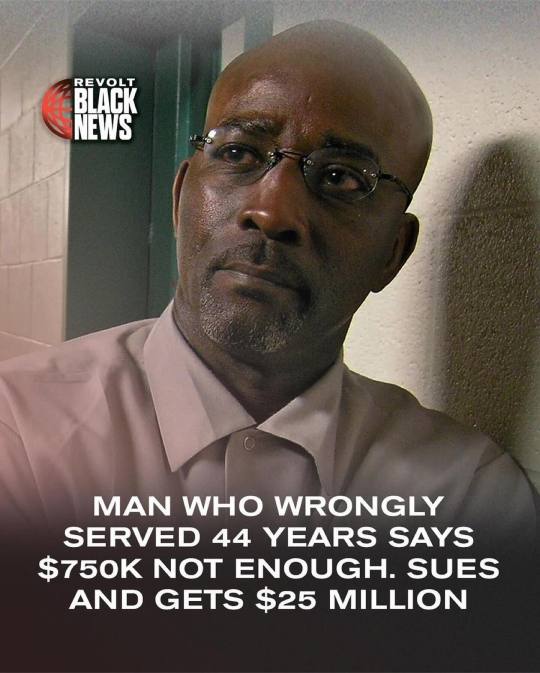
After serving 44 years for a rape and burglary he did not commit, 68-year-old Ronnie Long reached a settlement with the state of North Carolina for $25 million - the second largest wrongful conviction settlement in U.S. history.
Long was initially given only an insulting $750K in compensation. But after filing a civil lawsuit, he was awarded an additional $25 million along with a formal apology.
In 1976, Long was only 21 years old when an all-white jury that was “hand-picked by local law enforcement” convicted him of raping a “prominent” 54-year-old White woman in Concord, NC. He was given two life sentences.
An appeals court finally overturned his conviction in 2020, citing jury tampering by the police chief and false testimonies from detectives. Prosecutors also deliberately suppressed evidence that could have proven his innocence, including: a rape kit that collected 43 different fingerprints and a suspect’s hair that did not match Long’s. Semen samples also “disappeared” from evidence.
After his release, Long was eager to spend time with his family, including wife Ashleigh, who he married from prison in 2014. Sadly, both of Long’s parents died before seeing him freed and exonerated from this American nightmare. His mother passed just 30 days before his release. He told CBS News, “I know my mother and father died with a broken heart...I’m gonna tell them now, when I visit the gravesite, ‘Your son is clear.’”
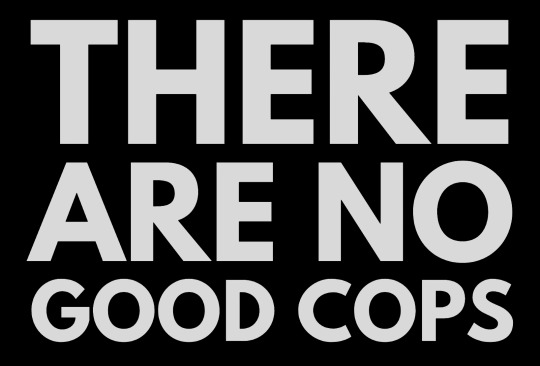
#police brutality#police corruption#police misconduct#acab#end police violence#justice for victims#police accountability#stop the abuse#cop watch#white supremacy#racism#social justice#equality#end hate#anti-racism#racial equality#stop racism#no to hate#dismantle racism
376 notes
·
View notes
Text

Shell Service Station in Winston-Salem, North Carolina, built in the 30s and listed on the National Register of Historic Places in the 70s.
409 notes
·
View notes
Text
On Appalachian and Southern Stereotypes
After seeing some people leap at the opportunity to insult and further harm us under my posts, even by obviously leftist accounts, I wanted to address some of the most popular stereotypes of our region.
Not as an excuse. There are many negative, violent and otherwise harmful features of the American South. We have a horrific history especially in terms of the violence we inflicted and continue to inflict upon the Black community that cannot be forgotten, and, as a culture, we do need to pay our dues.
But maybe this will help y’all apply some nuance to the situation and understand that we aren’t all your enemy.
Stereotype 1: Everyone is a Republican Racist
Absolute horse shit, my friends. There are people like me all over the south and in the hollers. We just get drowned out by the fascists, and it is all by design.
In my home state of North Carolina alone, they are working tirelessly to make it impossible for young, often liberal (if not outright leftist) voices to be heard. They specifically target regions with heavy POC populations.
As recently as May of this year, the North Carolina Supreme Court overturned their own previous ruling which once made gerrymandering illegal. This allows Republicans free range to draw their congressional lines wherever benefits them most.
Meanwhile, Roy Cooper, our Democratic governor, has been in office since 2017.
Gerrymandering is a real problem, and it reflects the worst of us. But it does not reflect all of us.
We are a working class, pro-union people.
We are coal miners and mill workers and farmers.
We took up arms against the government and fought for our labor rights during the Coal Wars as recently as the 1920s.
We bled for labor rights at the Battle of Blair Mountain.
It’s a myth that you keep perpetuating that we are all closed minded, bigoted regressionists. It diminishes the efforts of everyone from the coal miners to people like me while we try to make the region a better place.
It actually only worsens what you say that you wish you could “saw off into the ocean.”
That's my home you're talking about.
Stereotype 2: Everyone is Obese
36.3% of the overall population of the Southeast is obese. This is true.
Have you considered why that may be? For starters, Southerners are more likely to be uninsured compared to individuals living in the rest of the country.
"Among the total nonelderly population, 15% of individuals in the South are uninsured compared to 10% of individuals in the rest of the country."
Partially because they didn't even expand the same Medicaid benefits to us. and partially because we are just so fucking poor.
17% of the American South is below the poverty line, compared to 13% in the Midwest, 13% in the West, and 13% in the Northeast.
Percentages under 5% may not seem like much, but when you consider 1% of the total United States population is around 3,140,000 people, yeah, that adds up real quick.
How does this relate? Well...
Mississippi has 19.58% of its residents below the poverty line, and a 39.1% obesity rate.
West Virginia has 17.10% of its residents below the poverty line, and a 40.6 % obesity rate.
Kentucky has 16.61% of its residents below the poverty line, and a 40.4% obesity rate.
Are you seeing the trend?
We, generally speaking, are more likely to be unable to afford to feed ourselves wholesome foods, and we are less likely to be able to afford medical insurance--two things that are obviously important to maintaing good health and a "healthy" weight.
By the same token...
Stereotype #3: We're All Uneducated
The South and Appalachia are some of the lowest ranked in terms of educational funding and spending per pupil in the entire country. We don't even break the top 30 on the list, y'all.
49. Tennessee at $8,324 per pupil
47. Mississippi at $8,919 per pupil
45. Alabama at $9,636 per pupil
42. Kentucky at $10,010 per pupil
36. North Carolina at $10,613 per pupil
35. South Carolina at $10,719 per pupil
33. Georgia at $10,893 per pupil
32. West Virginia at $10,984 per pupil
The top three best-funded states, by comparison, receive between $18k and $20k per pupil.
In terms of higher education, student loans are a death sentence for everyone but especially impoverished kids just looking for a way out. It just isn't feasible for most of us. And that's if we even tested well after going to shitty schools our whole lives.
If we had better education, we'd have better literacy in all things, including critical thinking, allowing us to better see through the bullshit we are taught. But we don't. And you aren't helping the ones who are trying in spite of that.
Stereotype 4: Bad Teeth
Quickly going to touch on this one--when we consider a lack of access to affordable, healthy food, shitty medical insurance in general and our poverty rate, this one is kind of obvious. Even so:
“Dental coverage was significantly lower than the national average in the South Atlantic (45.6%), East South Central (45.6%), West South Central (45.9%), and Pacific (48.0%) regions.”
Every time you make a toothless hillbilly joke, ask if poverty is really the butt of the joke you want to be making.
These are just the most pervasive of them, imo. And they can all be underlined by extreme poverty which is absolutely by design.
It also contributes to why it isn’t so easy to “just leave” as we are so often dismissively told to do. Moving is expensive.
And why should we have to, anyway? Why should we have to flee our homes?
Why, for those who feel safe enough and/or have no other choice, should we not stay and fight to better the region?
And why can’t you other leftists get behind us and help us in our fight instead of perpetuating harmful stereotypes? We're your people, too.
Just some food for thought. And I hope some of y’all take a big ol bite.
#i am already exhausted#if you wanna discuss or for some reason argue any of these points my asks are open but i'm hopping off of here for now#appalachia#appalachian culture#appalachian mountains#southern usa#txt
514 notes
·
View notes